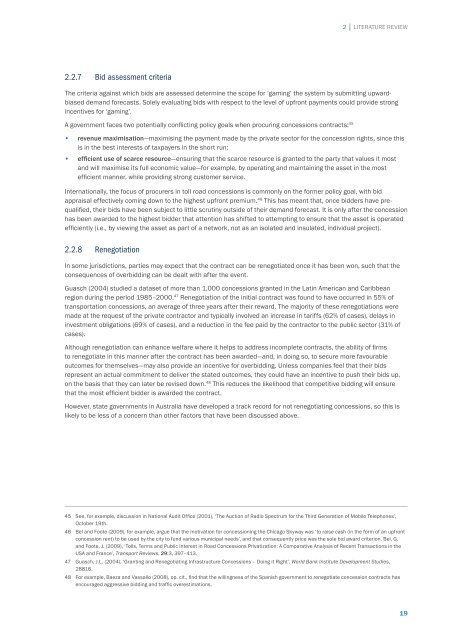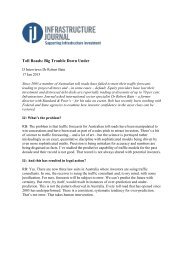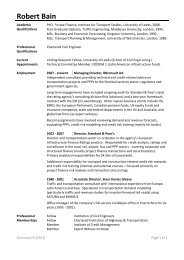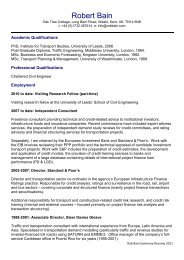Disincentivising overbidding for toll road concessions
Disincentivising overbidding for toll road concessions
Disincentivising overbidding for toll road concessions
- No tags were found...
Create successful ePaper yourself
Turn your PDF publications into a flip-book with our unique Google optimized e-Paper software.
2 │ LITERATURE REVIEW<br />
2.2.7 Bid assessment criteria<br />
The criteria against which bids are assessed determine the scope <strong>for</strong> ‘gaming’ the system by submitting upwardbiased<br />
demand <strong>for</strong>ecasts. Solely evaluating bids with respect to the level of upfront payments could provide strong<br />
incentives <strong>for</strong> ‘gaming’.<br />
A government faces two potentially conflicting policy goals when procuring <strong>concessions</strong> contracts: 45<br />
••<br />
revenue maximisation—maximising the payment made by the private sector <strong>for</strong> the concession rights, since this<br />
is in the best interests of taxpayers in the short run;<br />
••<br />
efficient use of scarce resource—ensuring that the scarce resource is granted to the party that values it most<br />
and will maximise its full economic value—<strong>for</strong> example, by operating and maintaining the asset in the most<br />
efficient manner, while providing strong customer service.<br />
Internationally, the focus of procurers in <strong>toll</strong> <strong>road</strong> <strong>concessions</strong> is commonly on the <strong>for</strong>mer policy goal, with bid<br />
appraisal effectively coming down to the highest upfront premium. 46 This has meant that, once bidders have prequalified,<br />
their bids have been subject to little scrutiny outside of their demand <strong>for</strong>ecast. It is only after the concession<br />
has been awarded to the highest bidder that attention has shifted to attempting to ensure that the asset is operated<br />
efficiently (i.e., by viewing the asset as part of a network, not as an isolated and insulated, individual project).<br />
2.2.8 Renegotiation<br />
In some jurisdictions, parties may expect that the contract can be renegotiated once it has been won, such that the<br />
consequences of <strong>overbidding</strong> can be dealt with after the event.<br />
Guasch (2004) studied a dataset of more than 1,000 <strong>concessions</strong> granted in the Latin American and Caribbean<br />
region during the period 1985–2000. 47 Renegotiation of the initial contract was found to have occurred in 55% of<br />
transportation <strong>concessions</strong>, an average of three years after their reward. The majority of these renegotiations were<br />
made at the request of the private contractor and typically involved an increase in tariffs (62% of cases), delays in<br />
investment obligations (69% of cases), and a reduction in the fee paid by the contractor to the public sector (31% of<br />
cases).<br />
Although renegotiation can enhance welfare where it helps to address incomplete contracts, the ability of firms<br />
to renegotiate in this manner after the contract has been awarded—and, in doing so, to secure more favourable<br />
outcomes <strong>for</strong> themselves—may also provide an incentive <strong>for</strong> <strong>overbidding</strong>. Unless companies feel that their bids<br />
represent an actual commitment to deliver the stated outcomes, they could have an incentive to push their bids up,<br />
on the basis that they can later be revised down. 48 This reduces the likelihood that competitive bidding will ensure<br />
that the most efficient bidder is awarded the contract.<br />
However, state governments in Australia have developed a track record <strong>for</strong> not renegotiating <strong>concessions</strong>, so this is<br />
likely to be less of a concern than other factors that have been discussed above.<br />
45 See, <strong>for</strong> example, discussion in National Audit Office (2001), ‘The Auction of Radio Spectrum <strong>for</strong> the Third Generation of Mobile Telephones’,<br />
October 19th.<br />
46 Bel and Foote (2009), <strong>for</strong> example, argue that the motivation <strong>for</strong> concessioning the Chicago Skyway was ‘to raise cash (in the <strong>for</strong>m of an upfront<br />
concession rent) to be used by the city to fund various municipal needs’, and that consequently price was the sole bid award criterion. Bel, G.<br />
and Foote, J. (2009), ‘Tolls, Terms and Public Interest in Road Concessions Privatization: A Comparative Analysis of Recent Transactions in the<br />
USA and France’, Transport Reviews, 29:3, 397–413.<br />
47 Guasch, J.L. (2004), ‘Granting and Renegotiating Infrastructure Concessions – Doing it Right’, World Bank Institute Development Studies,<br />
28816.<br />
48 For example, Baeza and Vassallo (2008), op. cit., find that the willingness of the Spanish government to renegotiate concession contracts has<br />
encouraged aggressive bidding and traffic overestimations.<br />
19






